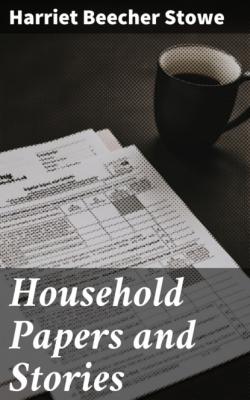Household Papers and Stories. Гарриет Бичер-Стоу
Читать онлайн.| Название | Household Papers and Stories |
|---|---|
| Автор произведения | Гарриет Бичер-Стоу |
| Жанр | Языкознание |
| Серия | |
| Издательство | Языкознание |
| Год выпуска | 0 |
| isbn | 4057664565327 |
Harriet Beecher Stowe
Household Papers and Stories
Published by Good Press, 2019
EAN 4057664565327
Table of Contents
II HOMEKEEPING VERSUS HOUSEKEEPING
IV THE ECONOMY OF THE BEAUTIFUL
VI THE LADY WHO DOES HER OWN WORK
VII WHAT CAN BE GOT IN AMERICA
I WHAT WILL YOU DO WITH HER? OR, THE WOMAN QUESTION
III A FAMILY TALK ON RECONSTRUCTION
VI BODILY RELIGION: A SERMON ON GOOD HEALTH
VII HOW SHALL WE ENTERTAIN OUR COMPANY
IX DRESS, OR WHO MAKES THE FASHIONS
X WHAT ARE THE SOURCES OF BEAUTY IN DRESS
XIII THE NOBLE ARMY OF MARTYRS
A SCHOLAR’S ADVENTURES IN THE COUNTRY
vii
INTRODUCTORY NOTE
Mrs. Stowe had early and very practical acquaintance with the art of housekeeping. It strikes one at first as a little incongruous that an author who devoted her great powers to stirring the conscience of a nation should from time to time, and at one period especially, give her mind to the ordering of family life, but a moment’s consideration will show that the same woman was earnestly at the bottom of each effort. In a letter to the late Lord Denman, written in 1853, Mrs. Stowe, speaking of Uncle Tom’s Cabin, said: “I wrote what I did because, as a woman, as a mother, I was oppressed and heartbroken with the sorrows and injustice which I saw, and because, as a Christian, I felt the dishonor to Christianity.” Not under the stress of passionate emotion, yet largely from a sense of real responsibility as a woman, a mother, and a Christian, she occupied herself with those concerns of every-day life which so distinctly appeal to a woman’s mind. How to order a household, how to administer that little kingdom over which a woman rules, and, above all, how to make family life stable, pure, and conservative of the highest happiness, these were the questions which she asked herself constantly, and which she tried to solve, not only incidentally in her fiction, but directly in her essays, and in that field of one tenth fiction and nine tenths didacticism, which constitutes most of the present volume.
A Scholar’s Adventures in the Country and Trials of a Housekeeper appeared in the miscellany to which she gave the name of The Mayflower, and reflect humorously the viii Cincinnati experiences which again are playfully recounted in letters published in her son’s Life. The former, contributed in 1850 to The National Era, was drawn pretty closely from the experiments of Professor Stowe. It is noticeable that in this paper and in Our Second Girl, which was contributed to The Atlantic Monthly for January, 1868, the author poses as the masculine member of the household, as if this assumption gave her some advantage in the point of view. At any rate, she adopted the same rôle when she came more deliberately to survey a wide field in a series of articles.
The House and Home Papers were contributed first to The Atlantic Monthly, and afterward published in book form as the production of one Christopher Crowfield, though there was not the slightest attempt otherwise at disguising the authorship. The immediate occasion of the papers was no doubt the removal of the Stowes from Andover and their establishment in Hartford, an event which took place shortly before the papers began to appear in The Atlantic. The years which followed during the first Hartford residence saw also a marriage in the family and new problems of daily life constantly presenting themselves, so that a similar series appeared in the same magazine, purporting to be from the same householder, entitled The Chimney Corner. This series, indeed, entered rather more seriously
